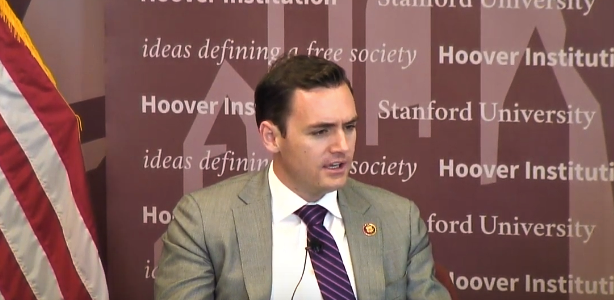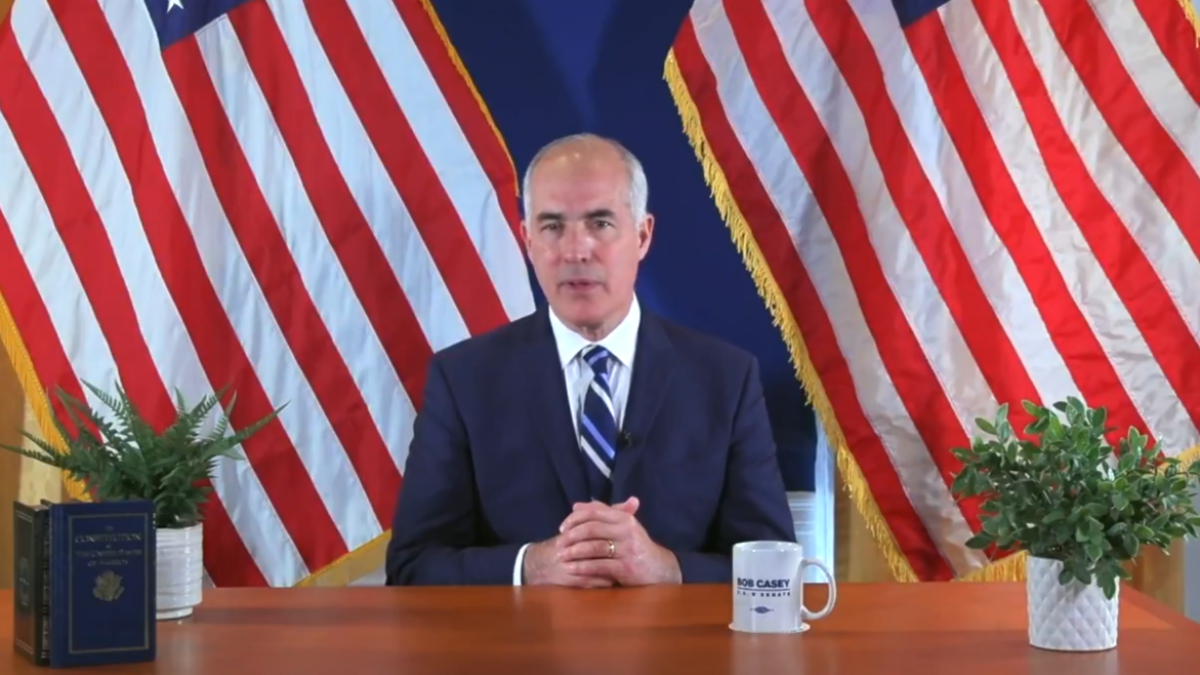Rep. Mike Gallagher of Wisconsin’s eighth district discussed his thoughts on congressional reform on Wednesday in an interview with Adam White of the Hoover Institution. Gallagher and White reviewed an article Gallagher wrote in The Atlantic, “How to Salvage Congress,” addressing the problems Gallagher has observed in his two years in Congress.
“Everyone is complaining about Congress,” Gallagher said. “Not just the American people but the members of Congress themselves, and yet we just keep doing things the same way.”
The interview was part of the Hoover Institution’s series “Opening Arguments: Conversations on American Constitutionalism,” intending to facilitate discussions about constitutional self-governance. White began by pointing out the obvious change in Congress since the time of the Federalist Papers, where James Madison wrote that Congress was the first branch of government that “draws all power into its ‘perpetuous vortex.’”
Congress has instead become a means for members to increase their fame and profiles, Gallagher said. This shift of the legislative body’s power away from Founding ideals began with Watergate and the creation of steering committees in the 1970s. Escalating in the ’90s the Republican majority transferred power from committees to House leadership, all resulting in Congress surrendering most of its constitutional authority to the executive branch.
[Listen to Gallagher with Ben Domenech on the Federalist’s Radio Hour]
Gallagher sees a “less-understood phenomena” on the Hill in the breaking down of the committee system. Power is being taken from the committees and concentrated with top members. With the House speaker and steering committees as control centers, Congress is stuck in redundant and ineffective cycles of continuing resolutions and moving from shut-down to shut-down.
Gallagher’s two years in Washington have reshaped his old hypothesis that Congress members were the source of the dysfunction. It is the institution itself that is dysfunctional. No matter how brilliant and hardworking members are, this bad system prevents Congress from effectively doing its job, a job that includes oversight of the executive branch, fulfilling constitutionally mandatory responsibilities, and being a deliberative body to legislatively solve problems.
“We are having kabuki theater debates,” Gallagher said. “We legislate occasionally but it is rarely a result of a deliberative process… And it is rarely legislation on the most important issues.”
Because of the imbalance of power in the House, legislation does not take shape with the traditional committee process. Legislation is now a rare collaboration of the legislative and executive when the top members of Congress meet with the president at the White House while the rest of Congress sits back and waits.
“No!” Gallagher said. “It’s supposed to start with the committee process – it’s supposed to start from the bottom up.”
Gallagher suggests three reforms. The first is to change the congressional calendar. Congress members waste time and taxpayer dollars traveling to their districts on weekends and back to Washington D.C. for the work week.
“It makes absolutely no sense,” Gallagher said.
This system leaves little time for what Congress members are supposed to do: legislation and oversight. Gallagher’s solution is changing the calendar to two weeks in D.C. and two weeks in the districts. This would allow Congress members more concentrated time to focus on the issues as well as their districts.
Gallagher’s second reform is changing the committee chair selection process. Because committee assignments are dictated by the steering committee, ambitious Congress members have an incentive to gain the steering committee’s approval by voting in line with leadership and spending money. There is no test to determine if you know about the issues on that committee and are an effective legislator.
This can be changed by making the members of the committee elect the committee chairs, thus delegating power back to the committees. If committee chairs are elected by members of the committee, incentives will change and aspiring committee chairmen will have to prove themselves productive members of the committee.
White raised a practical objection, saying that because the House is so large, strong leadership is necessary and was even created to make Congress productive. Gallagher responded saying: “Right now we are in a situation where all the power is with the speaker and other members of the leadership. We are in a strong and centralized paradigm right now and the results are obviously bad. The most obvious thing we could do is to reverse that trend and embark on a different experience.”
Gallagher’s third reform is streamlining committee jurisdiction. Gallagher sees the division between appropriations committees and authorizing committees at the source of Congress’ dysfunction.
“If you collapse the appropriations function into the authorization committee, that would make every single committee more powerful,” Gallagher said. “At the end of the day you just want members of Congress who are on those committees who understand those issues. You make each committee more powerful and therefore make the work of each Congressmen more meaningful.”
The key is to simplify committee structures. This can be done by comparing the committee structure and the executive branch structure to find how they can align more closely where certain policy areas share jurisdiction.
“In addition to simplifying appropriations and authorization, there are other efforts to take simply the overall committee structure which I think would result in better oversight,” Gallagher said.
Gallagher’s commonsense approach to his reforms aim at, through the distribution of power to members of the committees, members will have an incentive to do good legislative work on the issues.








